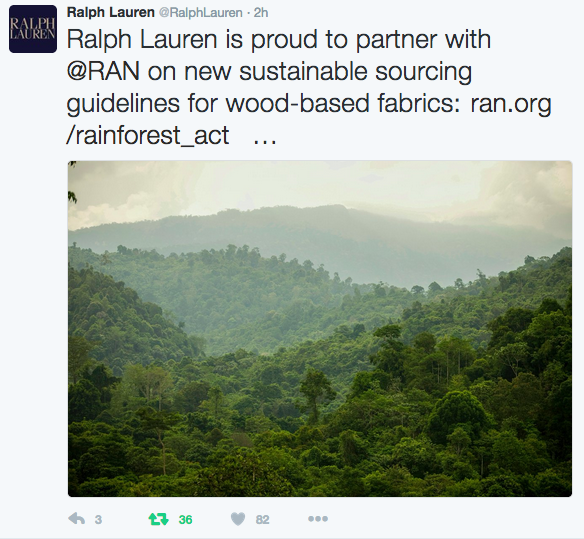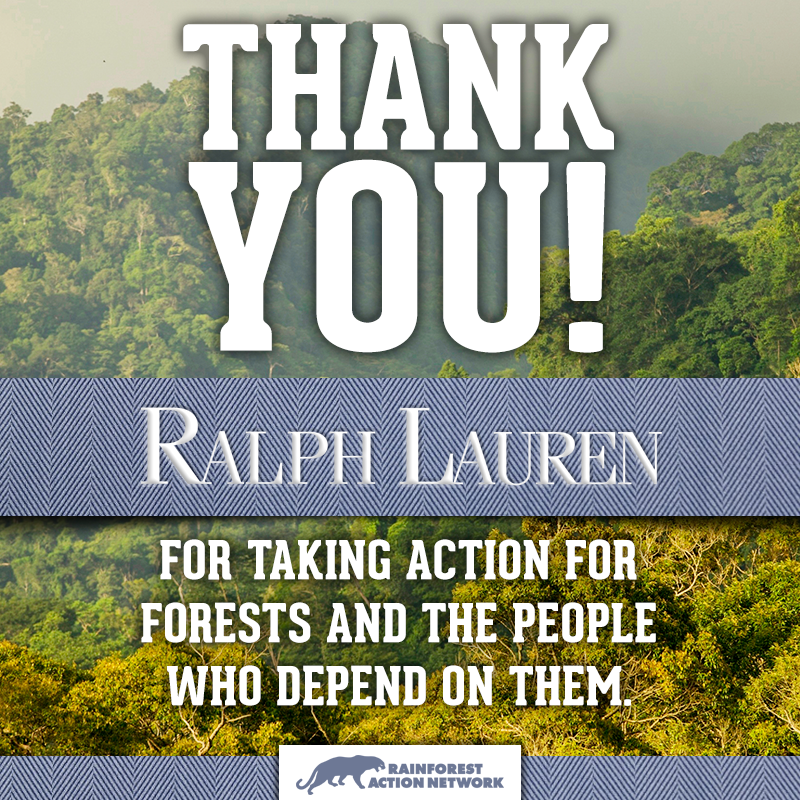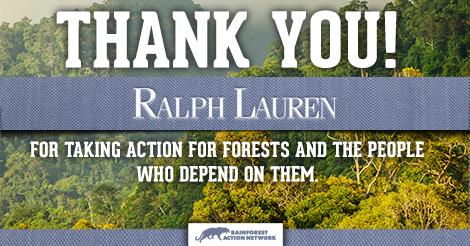Big news! After years of campaigning and corporate negotiation, Ralph Lauren just took the first step to end the risk of forest destruction in its clothing.
Ralph Lauren, the $7.9 billion global fashion icon, just announced its commitment to ensuring that it’s clothing—and all of its associated brands—do not contribute to rainforest destruction and human rights violations.
RAN’s Out of Fashion campaign singled out Ralph Lauren for six action-packed months. Here are just a few highlights:
- In June 2015, RAN activists diverted attention from the red carpet event at the Council of Fashion Designers of America by unfurling a 14-foot balloon banner with a Ralph Lauren parody logo that read, “When Deforestation is Part of Your Lifestyle.”
- At the company’s annual shareholder meeting in August 2015, RAN activists popped up again to hand out copies of our new report, “Lessons from the Incense Forest”, to encourage shareholders to raise these important issues to leadership in the meeting. The report detailed the struggles of the people of Pandumaan-Sipituhuta in North Sumatra, Indonesia on the frontlines of human rights abuses and forest destruction for wood-based fabrics.
- Over the past two years, there were roughly 19,000 email, Facebook, and Twitter online actions from supporters, and over 400 phone calls made to company leadership. Thank you to everyone who contributed to this campaign!
All this hard work paid off in June 2015, when Ralph Lauren came to the negotiating table to work with RAN in developing a policy on the sourcing of its wood-based fabric supply chain. Until working with RAN, Ralph Lauren did not have policies governing its procurement of wood-based fabrics, putting forests and frontline communities in Indonesia at risk.
While the final policy itself has not been officially released, Ralph Lauren has already communicated its commitment to its suppliers and committed to publicly releasing the final policy mid-2017. This process has inspired the company to look at its procurement for other raw materials, and it is now developing procurement policies for many of those fabrics too.

Ralph Lauren is joining the sea change of over 60 leading brands like H&M, Zara, Stella McCartney, ASOS, Levis Strauss & Co., and others, who have adopted similar rainforest-free fabric policies that are sending waves throughout fabric supply chains globally. Ralph Lauren is setting an example for other laggard companies to follow. RAN looks forward to seeing leadership from the other companies in the Fashion 15, like Abercrombie & Fitch, Michael Kors, Guess, Forever 21, Under Armour, and Footlocker.
Ralph Lauren’s commitment not only sends a signal to other companies but also to rayon and viscose producers in countries like Indonesia, where the production of pulp for fabrics has been devastating to Indigenous and forest-dependent communities. Land-grabbing is commonplace: just in the area controlled by pulp producer Toba Pulp Lestari in Northern Sumatra, Indonesia, over 15 distinct cases of land conflict have been documented where Indigenous community-owned land has been acquired and clear cut without the consent of communities.
This tragic legacy of forest degradation and human rights abuses is a reminder of the importance of achieving real, lasting results on the ground. RAN looks forward to our continued work with Ralph Lauren to ensure that its policies create real change on the ground.
